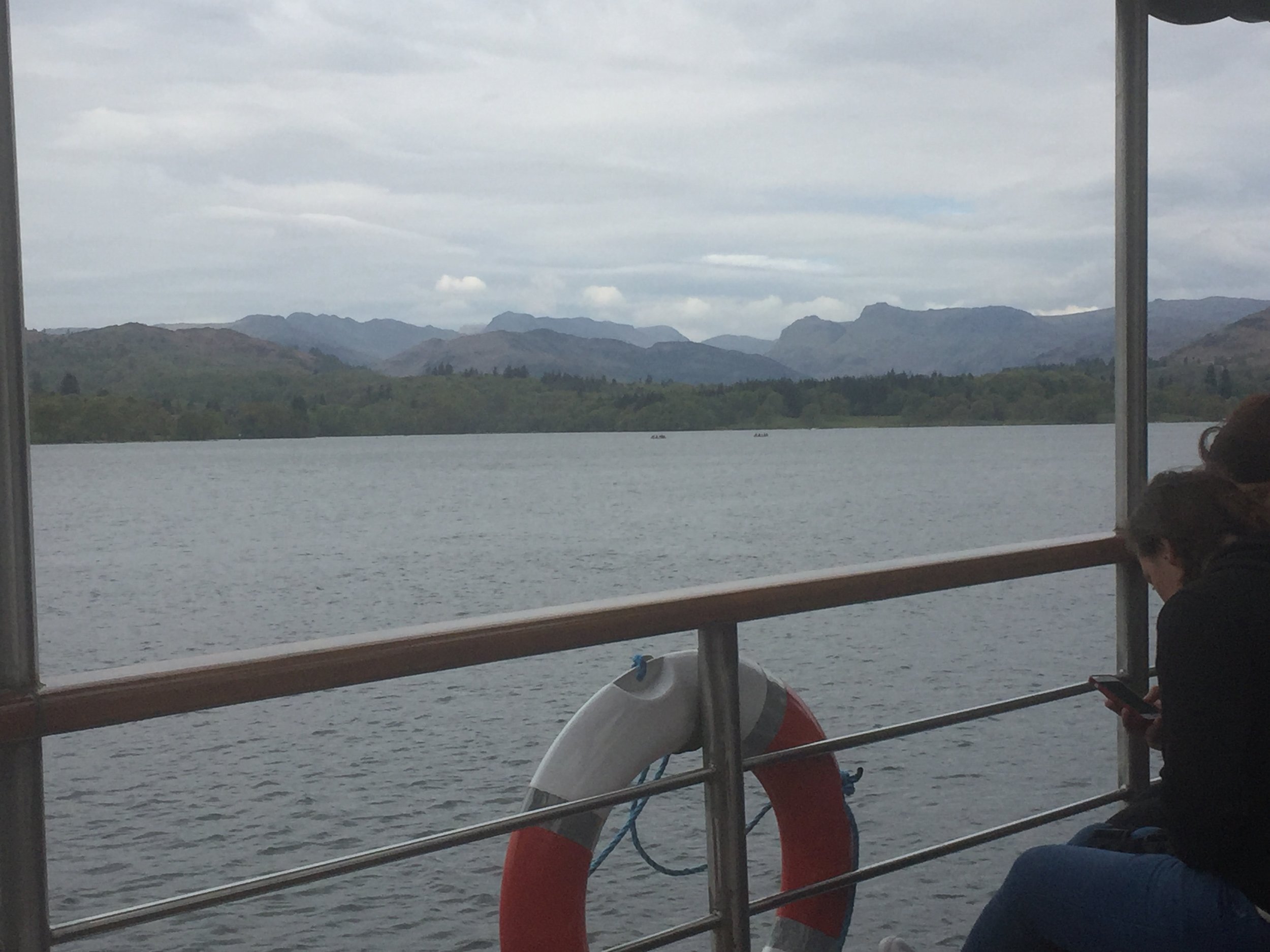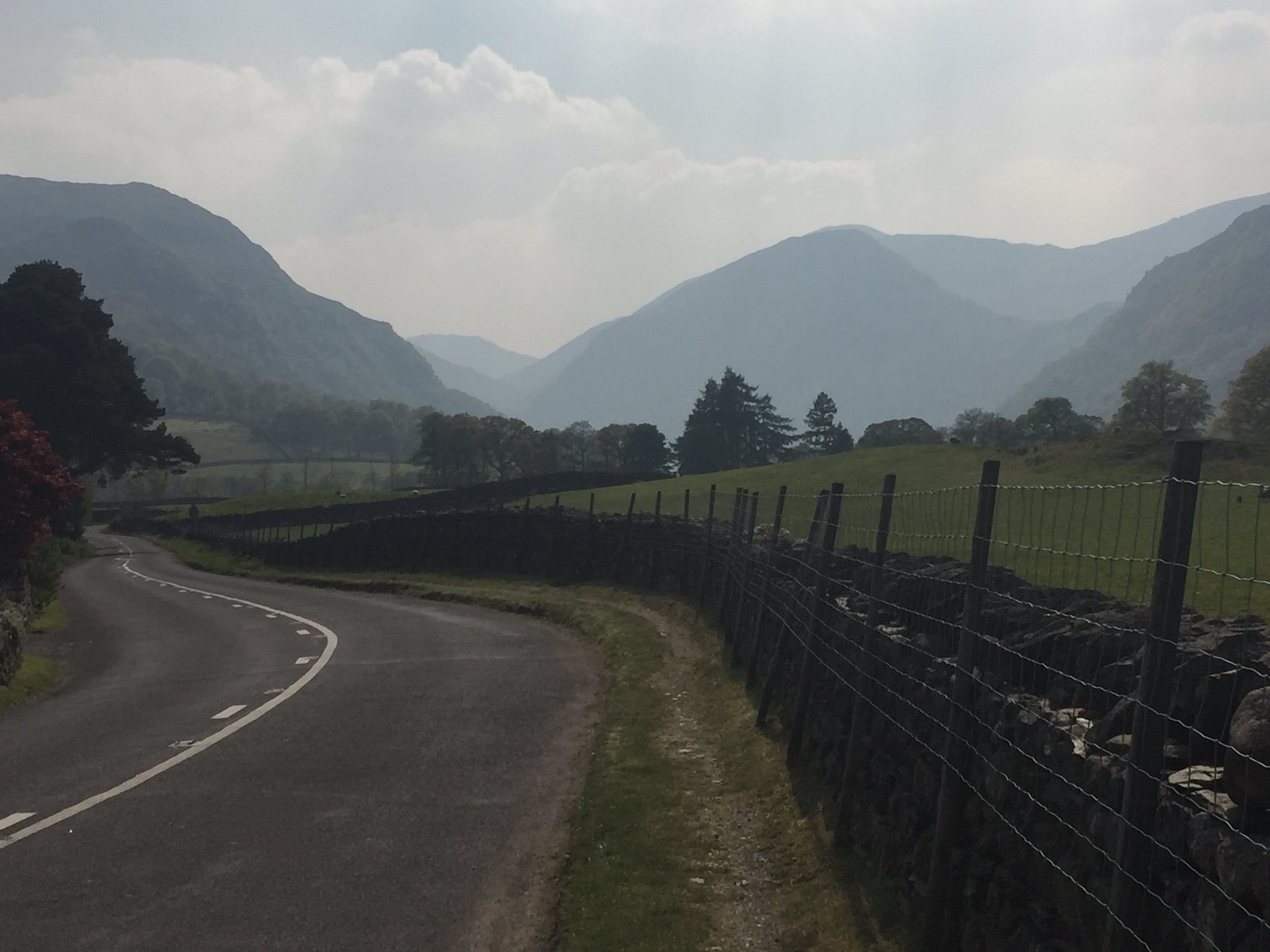The Lake District - trekking from pub to pub

What I am about to describe almost perfectly embodies the sort of trip and mindset which I look for: good company, public transport as needed and exercise when wanted, fresh air and dramatic scenery, seemingly endless options each day to pursue, and small inns and pubs strategically placed offering no frills basic, cheap but excellent rooms and meals. So this is a good intro to what these posts will be focused upon. This trip could not have been improved upon with the addition of a car; in fact a car would have made for a materially worse experience since our hiking starting and ending points were not the same.
In early May 2017 I flew in to Manchester UK for a 10 day backpacking trip with my friend Julian. We planned to hike in the Lake District in northwest England. (Backpacking here is more in the European traveling tradition, not camping.)
Travel buddies don’t get any better than Julian
We had talked about this trip for over a decade. He had way back around 2000 described to me an inn up in the Fells he had visited many years before, I think as a boy. It was at the end of the road and from there one could walk in almost any direction. It was old and used by hikers mainly, “fell walkers” (hill walkers). Entertainment was limited to conversation and drink in a fire-warmed hikers’ bar with wooden tables polished from cleaning up ages of spilt ales. No phones or TV. I found online what seemed to be the place he described, and in fact that was the spot. The Old Dungeon Ghyll, what a name.
Julian was taking the train up from Suffolk, while I was navigating the reasonably-sized Manchester airport, which was a breeze and fast (probably about 10 minutes to walk to and actually clear through passports and customs). No reason to fly in to London where transatlantic fares are considerably higher and train distances much farther away.
My train left right from the airport (a 5 minute walk) and a very pretty two hour ride brought me to the Lakes, stopping at Oxenholme first where my small local train connection was waiting across the track. It left as soon as I boarded. About 5 minutes later this tiny train shuffled into the small station at Windermere.
Arriving at Windermere
I walked a mile down the hill towards the lake of the same name, into the village of Bowness-on-Windermere where the ferries depart up and down lake and where we had arranged rooms upstairs at a small pub.
Many years ago, in 1967 our family stopped for a night here and I wanted to see what I could recognize. It seemed, unsurprisingly, smaller. That’s how memories go.
Pretty sure the end of this dock is about where my brother fell into the water in 1967
A word about that room in a pub. In the UK many pubs will let a few basic rooms upstairs for a modest charge. There is nothing fancy about these. A bed and usually a shared, not private, bath. The price is right and many, like this one, provided breakfast as well. No amenities, none are needed. Single occupancy rates are often available, as it was here. When looking for basic accommodations there, always check out the local pubs.
In the morning we boarded a ferry taking us to the head of Windermere at Ambleside. We could have just as easily taken a bus for far less time. I insisted on the boat.
First look at fells we would be hiking through
Upon disembarking we headed up to the inn at Skelwith Bridge about a mile away where we would spend a couple of nights and days doing circular trips, mainly through the sheep farms and walled pastures.
Trails usually pass through farms, all part of the National Park
The evening hike up to Loughrigg Tarn (Tarn is a small lake) was a highlight with the light being just right. Lucky shot.
Loughrigg Tarn, which unsurprisingly is just below Loughrigg Fell
We had resolved to let no pub be passed without stopping for refreshments. There were many of these.
Never pass by without stopping in
Eventually we headed further up into Great Langdale, the valley that dominates the northern headwaters of Windermere.
Footpath up into the Great Langdale, sheep eating grass which is how grass should be mowed
Let me just say right here, we did not cover large distances on any day, especially a day with backpacks on. I think this day was three miles and three pubs long. One of these was only about 300 yards from the destination, at the NEW Dungeon Ghyll, but stop we did.
Growing wilder as we get further up the dale
We reached the Old Dungeon Ghyll eventually for a couple more nights and days hill walking in the fells.
The inn that started us off
The Hikers Bar met expectations
A day hike over to Little Langdale was a long and rugged, but beautiful round trip.
You don’t miss out by taking local or regional busses as needed or convenient. We used them to complete round trips, allowing us to extend our reach on a day hike without having to find an actually circular trail. It also meant we could go further afield and so stop in more pubs.
We eventually headed back towards a town, ending up in the pretty and ancient market town of Keswick. For many years virtually all pencil lead came from nearby. There is a pencil museum there. Of course. There are also hostels, inns, pubs a bus transit hub, market street, and numerous outdoors equipment shops. From here the remainder of my trip relied upon the excellent and frequent bus system that criss crosses the whole of the Lakes. These never failed to take us where we wanted to go.
Bus heading into Borrowdale and over pass to Buttermere for lunch, at a pub.
Pub meals are hard to beat
Eventually the busses took me back to the train a few stations up the line from where I began, and then south to Manchester, where I flew home.
That 10 day trip crystallized for me how I wanted to travel from now on. Backpack, excellent transport options, small and basic inns. No car. It was about perfect.














